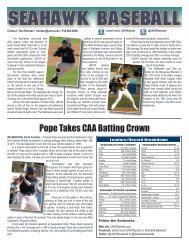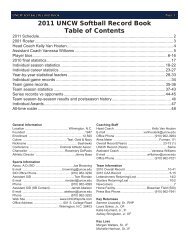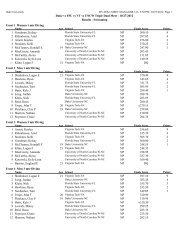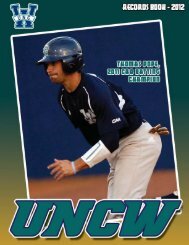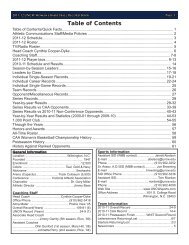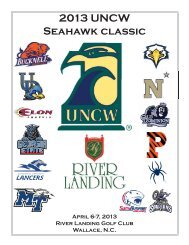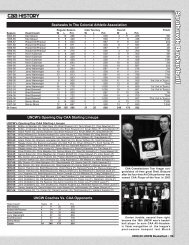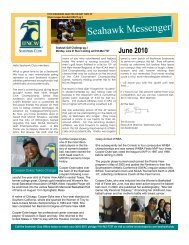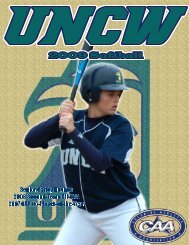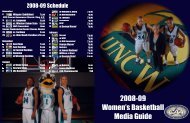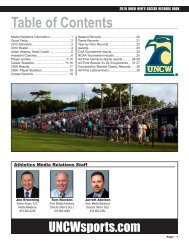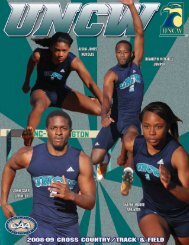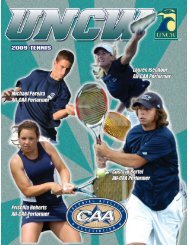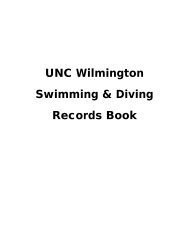- Page 1 and 2:
UNIVERSITY OF NORTH CAROLINA WILMIN
- Page 3 and 4:
UNIVERSITY OF NORTH CAROLINA at WIL
- Page 5 and 6:
IV. FINANCIAL ADMINISTRATION AND CO
- Page 7 and 8:
Game Day Functions Special Events C
- Page 9 and 10:
I. ATHLETIC STATEMENT OF PURPOSE In
- Page 11 and 12:
The Department of Athletics Mission
- Page 13 and 14:
Ethical Conduct and Sportsmanship P
- Page 15 and 16:
more stringent than departmental, u
- Page 17 and 18:
suspended or terminated. Staff Memb
- Page 19 and 20:
organizations and constituencies on
- Page 21 and 22:
virtual media guides, programs and
- Page 23 and 24:
DIRECTOR OF SPORTS MEDICINE Directl
- Page 25 and 26:
and intern staff. Also responsible
- Page 27 and 28:
UNCW ATHLETIC COUNCIL MISSION STATE
- Page 29 and 30:
athletes for academic awards and po
- Page 31 and 32:
arrangements for the visiting team
- Page 33 and 34:
POSITION DESCRIPTIONS DIRECTOR OF A
- Page 35 and 36:
OTHER CHARACTERISTICS OF POSITION:
- Page 37 and 38:
serving as a liaison with the CAA a
- Page 39 and 40:
BASIC FUNCTION: The Student Aid Ass
- Page 41 and 42:
This position also serves as sports
- Page 43 and 44:
The Assistant Athletic Director for
- Page 45 and 46:
esponsible for adhering to NCAA, CA
- Page 47 and 48:
Interpreting and carrying out unive
- Page 49 and 50:
BASIC FUNCTION: As Assistant Athlet
- Page 51 and 52:
and regulations. PROGRAM DIRECTION
- Page 53 and 54:
campaign volunteers, various busine
- Page 55 and 56:
keep them apprized of accomplishmen
- Page 57 and 58:
promotional plans. This position re
- Page 59 and 60:
operation of Seahawk Sports Marketi
- Page 61 and 62:
MONETARY RESPONSIBILITY: Season and
- Page 63 and 64:
academic progress and promoting the
- Page 65 and 66:
STATEMENT OF RESPONSIBILITY FOR CON
- Page 67 and 68:
direction of the program and assist
- Page 69 and 70:
OTHER CHARACTERISTICS OF POSITION:
- Page 71 and 72:
ADMINISTRATIVE SUPPORT STAFF / ATHL
- Page 73 and 74:
interpret and apply to situations.
- Page 75 and 76:
university community and prospectiv
- Page 77 and 78:
OTHER CHARACTERISTICS OF POSITION:
- Page 79 and 80:
PROGRAM DIRECTION AND DEVELOPMENT:
- Page 81 and 82:
ANNUAL LEAVE All full-time permanen
- Page 83 and 84:
University's annual operating budge
- Page 85 and 86:
Throughout the year, the Associate
- Page 87 and 88:
team travel represents a major expe
- Page 89 and 90:
changes must be provided to the Ath
- Page 91 and 92:
Fifteen passenger vans shall be loa
- Page 93 and 94:
A Travel Fund has been established
- Page 95 and 96:
Reimbursements for legitimate expen
- Page 97 and 98:
The recruiting packet required by t
- Page 99 and 100:
If a change order is required after
- Page 101 and 102:
Contact Purchasing Services by tele
- Page 103 and 104:
processed and items repaired or rep
- Page 105 and 106:
Any variations or exceptions to UNC
- Page 107 and 108:
More frequent deposits are required
- Page 109 and 110:
hard items to consumers. 1. Interna
- Page 111 and 112:
using the facility (i.e., utilities
- Page 113 and 114:
The results of these inventories wi
- Page 115 and 116:
Responsibilities of the Staff Membe
- Page 117 and 118:
TEAMS In regards to practice, first
- Page 119 and 120:
up/breakdown Harold Greene Track $5
- Page 121 and 122:
GENERAL All UNCW and coaches’ pri
- Page 123 and 124:
EXAMPLE OF SPORTS CAMP TIMELINE (JU
- Page 125 and 126:
Please keep a copy of this checklis
- Page 127 and 128:
particular sport, and all assignmen
- Page 129 and 130:
Information pertaining to the Depar
- Page 131 and 132:
individual records for each sport o
- Page 133 and 134:
TABLE OF CONTENTS SECTION I-ORGANIZ
- Page 135 and 136:
Asthma and Metered Dose Inhaler (MD
- Page 137 and 138: The Athletic Training Staff of UNCW
- Page 139 and 140: Sports Medicine Department Organiza
- Page 141 and 142: Develop and oversee a team of medic
- Page 143 and 144: Eligible/Possession of North Caroli
- Page 145 and 146: Bachelors degree from a regionally
- Page 147 and 148: Ability to communicate both verbal
- Page 149 and 150: services. It is the purpose of this
- Page 151 and 152: (1) Administer this Article. (2) Is
- Page 153 and 154: (2) Proof of practice in this State
- Page 155 and 156: application for licensure if the Bo
- Page 157 and 158: Performance Evaluations and Persona
- Page 159 and 160: providers are highly encouraged to
- Page 161 and 162: • UNCW Sports Medicine Sweatshirt
- Page 163 and 164: students will take priority in term
- Page 165 and 166: e available when CAA or NCAA events
- Page 167 and 168: equires that employers ensure their
- Page 169 and 170: detergent/disinfectant. Hand washin
- Page 171 and 172: Sharps containers - red, capped, pu
- Page 173 and 174: The Director of Athletic Training w
- Page 175 and 176: FORM A: THE UNIVERSITY OF NORTH CAR
- Page 177 and 178: FORM C: THE UNIVERSITY OF NORTH CAR
- Page 179 and 180: FORM E: THE UNIVERSITY OF NORTH CAR
- Page 181 and 182: FORM F: THE UNIVERSITY OF NORTH CAR
- Page 183 and 184: FORM H: THE UNIVERSITY OF NORTH CAR
- Page 185 and 186: Arrive on time for clinical hours a
- Page 187: Student-Athlete Responsibilities St
- Page 191 and 192: Coaches’ Responsibility PURPOSE:
- Page 193 and 194: POLICY STATEMENT: This policy is de
- Page 195 and 196: Any student interested in trying ou
- Page 197 and 198: Exit Physical Assessment Policy PUR
- Page 199 and 200: STEPS FOR PROCESSING MEDICAL BILLS
- Page 201 and 202: 3. Once the MRI is complete, the re
- Page 203 and 204: 4. Once the MRI is complete, the re
- Page 205 and 206: (HIPAA). Sports Medicine Staff memb
- Page 207 and 208: Web universal resource locators (UR
- Page 209 and 210: Telephone Procedures: Members of t
- Page 211 and 212: forms distributed and used by the U
- Page 213 and 214: SECTION VII MEDICAL AND CLINICAL PO
- Page 215 and 216: Asthma and Metered Dose Inhaler Pol
- Page 217 and 218: 25 breaths per minute, inability to
- Page 219 and 220: It is the athlete’s responsibilit
- Page 221 and 222: 1. Remove the cap and hold the inha
- Page 223 and 224: impairment of neurological function
- Page 225 and 226: CT and MRIs have been found to be o
- Page 227 and 228: Post-Concussion Exertional Testing
- Page 229 and 230: Extreme thirst Frequent urination
- Page 231 and 232: Role of the Athletic Training Depar
- Page 233 and 234: Cutaneous manifestations in anaphyl
- Page 235 and 236: Any patient requiring epinephrine a
- Page 237 and 238: than 8%. A higher carbohydrate leve
- Page 239 and 240:
site achieved and the student-athle
- Page 241 and 242:
9. Do not ignore skin infections, p
- Page 243 and 244:
Pregnancy can also pose certain hea
- Page 245 and 246:
All UNCW Team Physicians will sign
- Page 247 and 248:
3. Phonophoresis Medications (Hydro
- Page 249 and 250:
FORM B AGENT OF RECORD STATEMENT Th
- Page 251 and 252:
FORM C UNSECURED MEDICATION EXCEPTI
- Page 253 and 254:
Sports medicine staff members, phys
- Page 255 and 256:
Sickling is often confused with hea
- Page 257 and 258:
12. Student-athletes with positive
- Page 259 and 260:
SECTION VIII AUXILIARY SERVICES POL
- Page 261 and 262:
ii. Notifies or is notified by Dire
- Page 263 and 264:
i. Coordinates communication with A
- Page 265 and 266:
Head Coach: Be aware of involved pa
- Page 267 and 268:
Public safety (PS) - crowd safety/c
- Page 269 and 270:
Student-athletes requiring temporar
- Page 271 and 272:
with a game or other activity despi
- Page 273 and 274:
A. Personnel should not return to t
- Page 275 and 276:
Certified athletic trainers and ath
- Page 277 and 278:
Nutritional Services Policy POLICY
- Page 279 and 280:
Emergency Personnel - Certified/Lic
- Page 281 and 282:
the University’s Student Health S
- Page 283 and 284:
Annual evaluation of the policies a
- Page 285 and 286:
Scott Julie Stacy Aldo Margery Step
- Page 287 and 288:
Appendix II Staff Performance Evalu
- Page 289 and 290:
EPA Performance Evaluation Template
- Page 291 and 292:
1 2 3 4 5 7. communicates effective
- Page 293 and 294:
Appendix III Preseason Pre-Particip
- Page 295 and 296:
Epilepsy /seizures Y N Anorexia/bul
- Page 297 and 298:
Back (strain, chronic pain, slipped
- Page 299 and 300:
Student-Athlete Signature Date Pare
- Page 301 and 302:
Musculoskeletal Examination Name __
- Page 303 and 304:
Athlete’s Name Male / Female (Fir
- Page 305 and 306:
PLEASE COMPLETE THE FOLLOWING INFOR
- Page 307 and 308:
FERPA Form for release of Student-A
- Page 309 and 310:
FERPA Form for release of Student-A
- Page 311 and 312:
FERPA Form for release of Student-A
- Page 313 and 314:
UNIVERSITY OF NORTH CAROLINA WILMIN
- Page 315 and 316:
I, the undersigned, hereby acknowle
- Page 317 and 318:
PHYSICAL CONDITIONING PROGRAMS POSE
- Page 319 and 320:
is listed in Appendix B. D. TESTING
- Page 321 and 322:
i. NOTIFICATION OF PARENTS: THE STU
- Page 323 and 324:
1. BASIS FOR TEST: WHEN A STUDENT A
- Page 325 and 326:
g. THE STUDENT ATHLETE MUST BE GIVE
- Page 327 and 328:
THE CONTRACTUAL AGREEMENT BETWEEN T
- Page 329 and 330:
Some Examples of NCAA Banned Substa
- Page 331 and 332:
APPENDIX E3 Notification of Schedul
- Page 333 and 334:
___ Full Sport Participation - NO R
- Page 335 and 336:
Annual review and update of the EAP
- Page 337 and 338:
- Will be able to implement emergen
- Page 339 and 340:
3) Activation of emergency medical
- Page 341 and 342:
EMERGENCY PLAN SOCCER FIELD- MEN’
- Page 343 and 344:
10 - Trask Coliseum 10A- Nixon Anne
- Page 345 and 346:
3) Activation of Emergency Medical
- Page 347 and 348:
EMERGENCY PLAN Men’s and Women’
- Page 349 and 350:
43 10 - Trask Coliseum 10A- Nixon A
- Page 351 and 352:
· Certified/Licensed Athletic Trai
- Page 353 and 354:
EMERGENCY PLAN Brooks Field - Baseb
- Page 355 and 356:
49 10 - Trask Coliseum 10A- Nixon A
- Page 357 and 358:
· Certified/Licensed Athletic Trai
- Page 359 and 360:
EMERGENCY PLAN Trask Coliseum - Men
- Page 361 and 362:
55 10 - Trask Coliseum 10A- Nixon A
- Page 363 and 364:
· Person placing 911 call will dir
- Page 365 and 366:
EMERGENCY PLAN Trask Coliseum, Hano
- Page 367 and 368:
61 10 - Trask Coliseum 10A- Nixon A
- Page 369 and 370:
- Will be certified in First Aid an
- Page 371 and 372:
X. UNCW STUDENT AID ASSOCIATION PUR
- Page 373 and 374:
STUDENT-AID ASSOCIATION BYLAWS BYLA
- Page 375 and 376:
d. In the event of a vacancy in the
- Page 377 and 378:
8. Removal. Any board member may be
- Page 379 and 380:
1. All donations and contributions
- Page 381 and 382:
a. The Executive Committee shall be
- Page 383 and 384:
SECTION XIII- Internal Control Proc
- Page 385 and 386:
Distribution of programs through sa
- Page 387 and 388:
team is considered to be a valuable
- Page 389 and 390:
Alcoholic beverages, outside food a
- Page 391 and 392:
XII. ATHLETIC ACADEMIC SUPPORT SERV
- Page 393 and 394:
and an athletic scholarship during
- Page 395 and 396:
athletes. To support student-athlet
- Page 397 and 398:
Repeat Policy Students who receive
- Page 399 and 400:
have supporting documentation from
- Page 401 and 402:
NCAA CHAMPS/Life Skills Program The
- Page 403 and 404:
Encourage student-athletes to enric
- Page 405 and 406:
Article VI: All amendments must be
- Page 407 and 408:
5. educational expenses awarded by
- Page 409 and 410:
3. for any other athletics reason A
- Page 411 and 412:
I Summer School Scholarships i Stud
- Page 413 and 414:
-medical expenses (except those cov
- Page 415 and 416:
• No apparel with another univers
- Page 417 and 418:
I Draft and Inquiry i A student-ath
- Page 419 and 420:
UNCW is committed to operating its
- Page 421 and 422:
Office. Copies of the report will b
- Page 423 and 424:
and nomination information to coach
- Page 425 and 426:
y a subcommittee from the Athletics
- Page 427 and 428:
The Director of Athletics, through
- Page 429 and 430:
collaborating in the senior exit in
- Page 431 and 432:
at all times. Additionally, the Ath
- Page 433 and 434:
immediately. o Individuals other th
- Page 435 and 436:
The Athletics Department has establ
- Page 437 and 438:
Any reduction or cancellation of ai
- Page 439 and 440:
Financial Aid Office will approve,
- Page 441 and 442:
Student-athletes are admitted to th
- Page 443 and 444:
committee is comprised of the Assoc
- Page 445 and 446:
Mid-Year Certification Process A. T
- Page 447 and 448:
number of transferable credits, and
- Page 449 and 450:
9. The year-end, final version of t
- Page 451 and 452:
Pass six hours during term 3 Maint
- Page 453 and 454:
student-athletes may request to kee
- Page 455 and 456:
6. Reimbursement request is reviewe
- Page 457 and 458:
6. Coaches will submit the faciliti
- Page 459 and 460:
7. Director of Athletics signs men
- Page 461 and 462:
Student-athletes may receive four c
- Page 463 and 464:
conduct/behavior will automatically
- Page 465 and 466:
student‐athletes’ experiences,
- Page 467 and 468:
XXIII. APPENDICES ATHLETIC DEPARTME
- Page 469 and 470:
Boseman Field - Softball Brooks Fie
- Page 471:
CAA Weekly Practice Report - Men's



